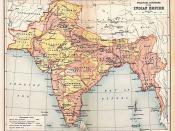Throughout history, countries have extended their rule and government to other countries. This is called Imperialism. During the late nineteenth and early twentieth centuries, imperialism became an important issue in India. The Europeans, namely the British, began colonizing vast portions of India. These imperialistic movements had varying effects, some with positive repercussions, while other effects ended negatively.
The British took control of India knowing they would gain much by doing so. In an excerpt from O.P. Austin's "Does Colonization Pay?" he states, "Modern progressive nations seek to control "garden spots" in the tropics," or areas of the country that have the tropical produce the British citizens need. The British were also able to create laws that were unjust to the Indians. By supplying India with railways, roads, canals, and telegraph systems, the British were able to control India better by making the citizens dependent on them.
Although the colonization of their country was viewed as unjust by Indians, the people gained many things from the British occupation.
The British modernized India in many ways when they took control. In his writings, Austin tells us, "They [British] develop the territory by building roads, canals, railways, and telegraphs. The progressive nations can establish schools and newspapers for the people of the colonies." The children were given western educations, which put them more in touch with the more modern world. In his works titled India: A Restatement, Sir Reginald Coupland writes, "One result of the new order was a steady rise in the value of India's export trade." This changed India's economic status. Coupland also mentions the British' "Early action...taken to stop infanticide [the killing of girl babies]," as well as forbidding slave trade. The British changed India culturally by banning those customs. India adopted a parliamentary system, the British from of government.


